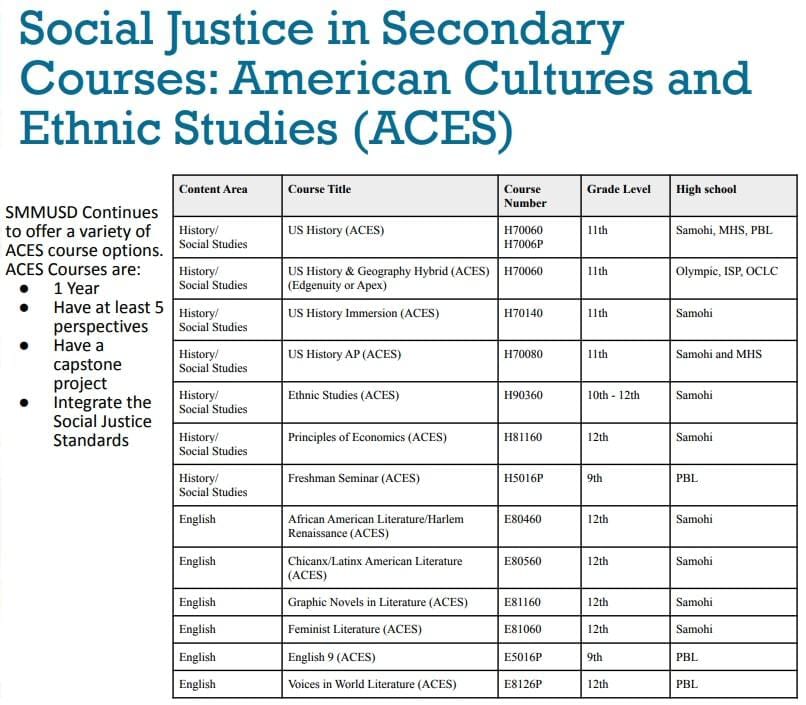The continual progression towards a socially just curriculum within Santa Monica-Malibu Unified School District (SMMUSD) was recently examined at a meeting of the SMMUSD Board of Education, giving time for board members to reflect on school successes and continued challenges moving forward.
At the board meeting on May 16, SMMUSD Coordinator of American Cultures & Ethnic Studies Erin Hill provided an annual update on social justice studies within the district. The report emphasized the first goal of the SMMUSD Local Control and Accountability Plan (LCAP), part of which being that "all graduates are socially just."
Hill also presented the bevy of American Cultures and Ethnic Studies (ACES) courses available to high school students, an initiative taken up by the district after Assembly Bill 101’s passing in October 2021 that includes ethnic studies as a high school graduation requirement. With courses ranging from history and social studies to English courses studying African-American and Latino literature, Hill noted that the district remains "at the forefront" of the requirements laid out by Assembly Bill 101.
"Through ACES courses offered within the district, students gain access to a diverse range of educational opportunities which allows them to explore various aspects of ethnic studies and engage with multicultural perspectives," Hill said.

Teachers on both the middle and high school levels made hands-on learning a focus on social justice topics this year. At John Adams Middle School, students participated in a mock trial of literary characters from the short story "Harrison Bergeron," as well as completed a project researching inventors and creating commendations of their work. At Samohi, projects included a 10th grade world history "assembly line," where students stood up against a fictional company for unfair labor practices.
The district’s work to build a just mindset for students will continue at Lincoln Middle School, which was recently approved to be a partner location with Facing History & Ourselves, an organization dedicated to creating inclusive classrooms through what it calls "transformative learning experiences."
As the presentation moved discussion, board member Jon Kean asked Hill how ACES courses are going to represent neurodiverse individuals, with Hill responding that reviews of curriculum guides ask questions of "are we truly representing our students in the curriculum." She added that neurodiversity could be an update for future consideration.
Kean’s follow-up question dealt with how teachers can make sure ACES classes include respectful discussions about certain topics, not wanting to fall in a "trap" of discussions devolving into simply taking "sides" in complicated issues.
"We’re not looking at things of bad, good, this or that, there are multiple layers and complexities to any perspective and we need to give space to that to understand it, and if we’re not willing to understand these multiple aspects of it, then how are we as teachers going to have conversations with our students and have a space that allows that to occur," Hill responded.
To gain a student perspective, the board turned to student board member Mira Wagabaza, who stated that "whatever pathway at (Samohi) people choose," they indeed gain ACES instruction, but her personal experience with one course gave her a less than desired result.
She added that other students she’s heard from do enjoy the courses, but the report gave the board pause on how to further improve the curriculum. Staff continue to add updates to social justice learning through the Teaching Learning Council, composed of teachers from across school sites that meet once a month to discuss lesson plans.
"This is a work in progress … it’s a process and we’re working toward (our goals)," SMMUSD Superintendent Dr. Antonio Shelton said.

